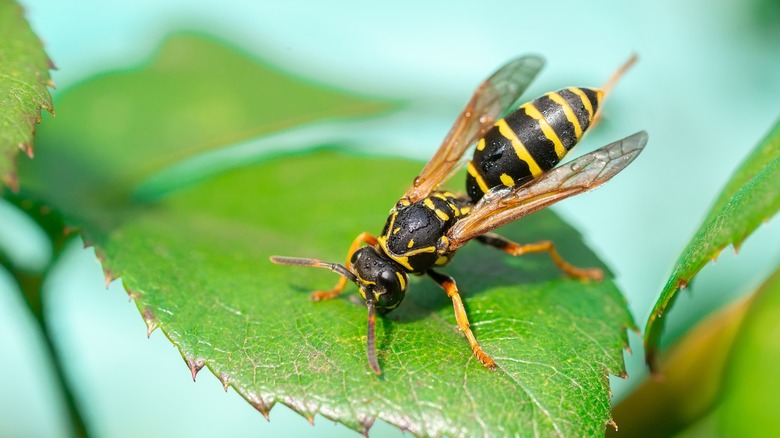The Wasp-Repelling Herb You'll Want To Plant In Your Garden ASAP
Wasps are natural predators that attack when they feel threatened and can inflict their victims with painful stings and potentially life-threatening allergic reactions. That being said, an angry group of wasps is the last thing you want to run into when innocently tending to your garden. Fortunately, there is a way to avoid this. Incorporating basil plants in your garden helps to ensure wasps stay away, allowing you to continue caring for your thriving fruits and vegetables.
Basil is a fan favorite amongst chefs looking to take a savory meal to the next level, but the stunning characteristics that draw humans to the herb are the same ones that draw wasps away. They despise its saturated green color and its strong scent, which is the result of eugenol, a highly aromatic oil extract that is also responsible for the strong scents in oregano, thyme, nutmeg, and cinnamon bark. Also, basil plants require minimal maintenance. As long as the tropical herb receives six to eight hours of sunlight each day and an adequate amount of heat, it will thrive and produce enough to keep wasps far, far away.
How to incorporate it
There are many ways to incorporate basil as a natural wasp deterrent in your garden. The first and most obvious is by planting basil in your garden. This herb is easy to grow and is the perfect companion for bell peppers, tomatoes, and other herbs, like cilantro and parsley.
Even if you aren't looking to add another plant to your garden, you can still reap the wasp-deterring benefits that basil offers. Instead of incorporating an entire plant, add clippings of another basil plant or even just fresh basil from the produce market. Scatter them across the soil in your garden and in any areas you would like to stay wasp-free. Because they have eugenol oil extract in them, individual basil leaves deter wasps similarly to how a full plant would. No matter how you incorporate this effective hack in your garden, it serves as the perfect pest repellent that is both 100% natural and safe for humans, pets, and other plants.
